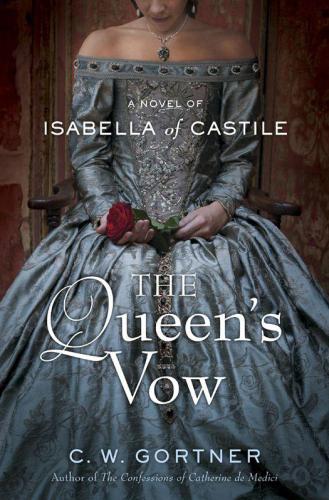
The Queen's Vow
A Novel of Isabella of Castile
کتاب های مرتبط
- اطلاعات
- نقد و بررسی
- دیدگاه کاربران
نقد و بررسی

April 23, 2012
Gortner (The Confessions of Catherine de Medici) returns with another examination of European royalty in his fifth historical. With older brothers Enrique and Alfonso set to inherit the throne of Castile, Isabella was an unlikely queen. But Alfonso dies in a failed coup, and Enrique proves an ineffectual leader, leaving Isabella the obvious heir. Isabella and Enrique quickly clash when she refuses to marry for his political gain. In an act of rebellion, she weds Ferdinand of Aragon, heir to the impoverished neighboring kingdom. When Enrique dies, Isabella ascends to the throne and rules Castile and Aragon, with Ferdinand by her side, fending off invasions, debts, and other pressures. Along the way she starts a cultural renaissance in Spain and commissions Christopher Columbus, but also allows the Inquisition to resume. Gortner’s exhaustive look at Isabella’s rise to power eventually trails off and feels directionless. Despite being a compelling female figure in European history, this Isabella is never particularly interesting, nor are the contradictions of her rule examined. Readers will spend much of their time waiting for the pace to pick up. Agent: Jennifer Weitz, the Jean V. Naggar Literary Agency.

April 15, 2012
Isabella of Castile, the intelligent and fiery Spanish queen best remembered today for funding the voyages of Christopher Columbus, begins this historical novel as a mere pawn in the decadent court of her weak older brother. When controversy arises over the legitimacy of her brother's heir, Isabella's tenacity and ruthlessness allow her to seize the throne with the help of her beloved Ferdinand of Aragon. After she is crowned, however, Isabella faces continued threats to the security of the realm not only from outside sources but also from Ferdinand's own pride and arrogance. Gortner pays particular attention to the religious issues Isabella confronted during her reign, portraying her as a complex figure who only reluctantly adopted measures such as establishing the now-infamous Spanish Inquisition and expelling all Jews from Spain after agonizing over the potential consequences. VERDICT Gortner's latest historical novel after The Confessions of Catherine de Medici is set at the beginning of the extremely popular Tudor era (Isabella's daughter Catherine marries Henry VIII), but it feels fresh owing to his choice of subject and the focus on events in Spain rather than England. It should thus have strong appeal for historical fiction fans looking for a new perspective on a favorite time period; if they like this title, they might also try Gortner's The Last Queen, about Isabella's other daughter, Juana the Mad.--Mara Bandy, Champaign P.L., IL
Copyright 2012 Library Journal, LLC Used with permission.

April 15, 2012
Gortner (The Tudor Secret, 2011; The Confessions of Catherine de Medici, 2010) turns his attention to one of Europe's most formidable queens, Isabella of Castile. His account begins in 1464, when 13-year-old Isabella, her mother, and her brother are living in penury, having been sent away from court when her father, King Juan II, died and her half-brother Enrique became king. It ends in 1492, when she sponsors Christopher Columbus' voyage to the new world. The entire period in between is marked by war. Unique among most royal women of her age (her daughters included), Isabella makes her own choice of a husband, and her marriage in 1469 to Ferdinand of Aragon unites their two kingdoms. After she becomes queen of Castile in 1474, there are more battles to be fought with rival claimants to the throne, rebellious grandees, the neighboring Portuguese, and the Moors still holding Granada. Isabella also grapples with the issues that lead to the launching of the Spanish Inquisition and the expulsion of the Jews. Gortner avoids romanticizing and sentimentalizing and presents a believable account of a woman determined to control her own fate and shape Spain into a great country.(Reprinted with permission of Booklist, copyright 2012, American Library Association.)

























دیدگاه کاربران